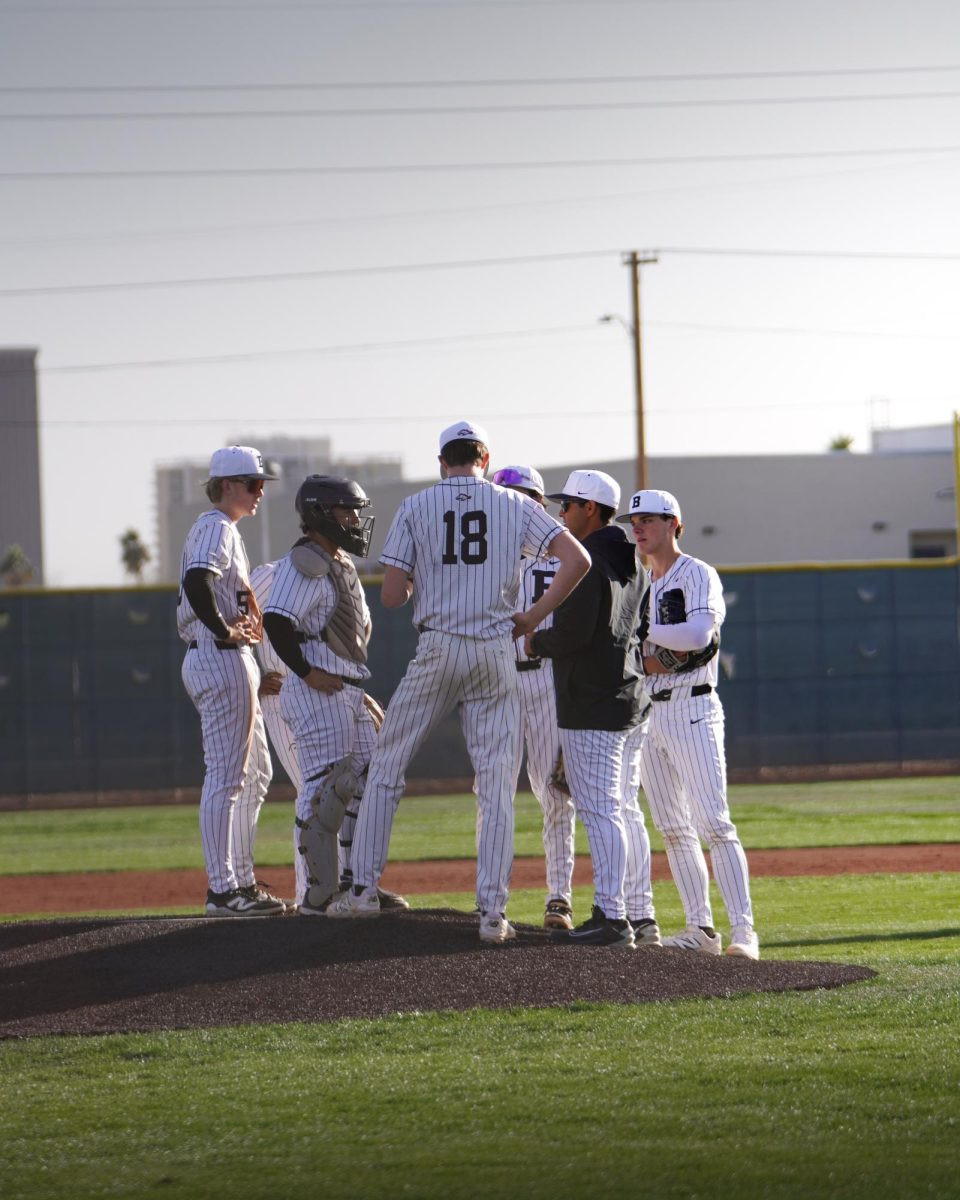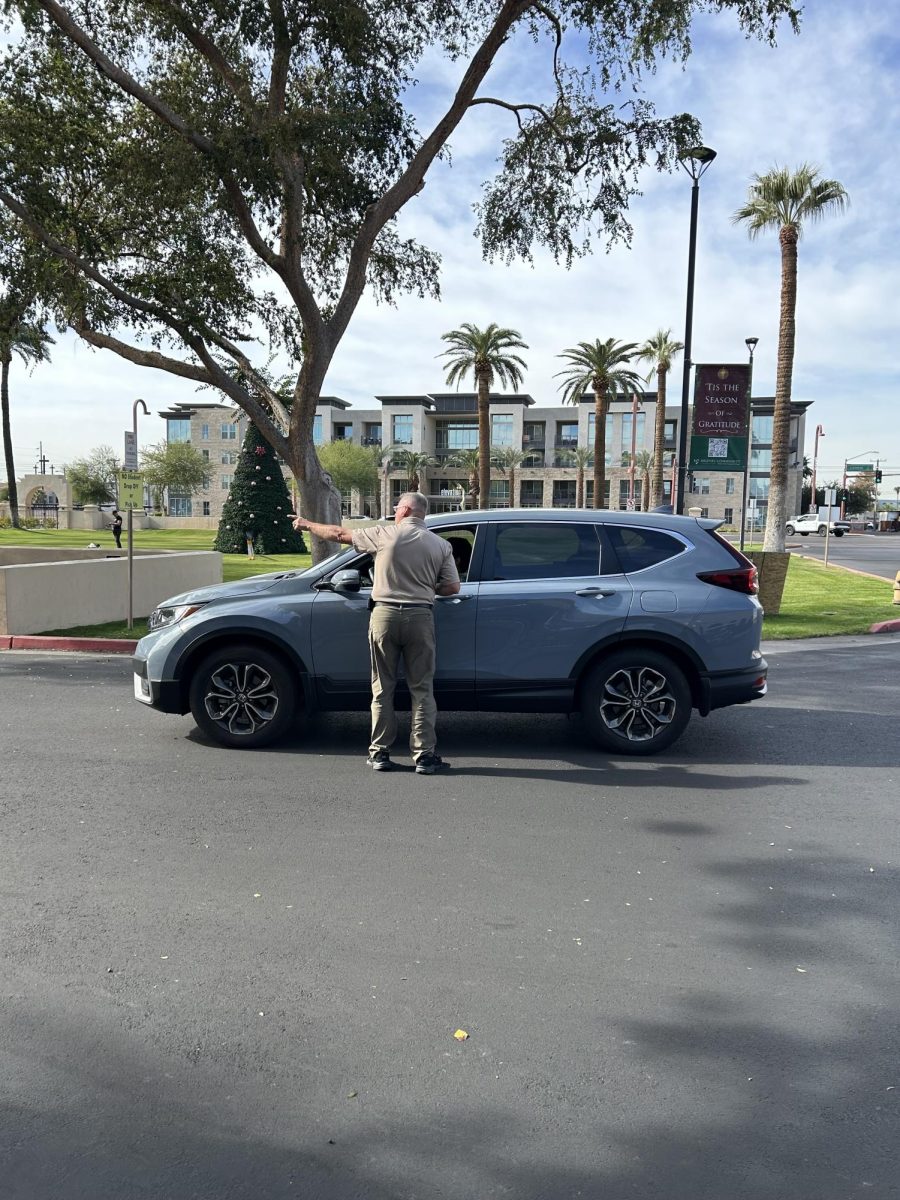Photo by Harrison Cohen ’20 | Velocity Club displays Brophy’s trash from Oct. 7, 2019, in the Octagon.
By Harrison Cohen ’20 and Ryan Middlemist ’20
THE ROUNDUP
Brophy has been making varied sustainability efforts, with examples of awareness posters about plastic bottles, green stickers reminding students about their impact on the environment when using paper towels and resource conservation programs. Most recently, the Velocity Club has taken action by planning various sustainability efforts in both the Brophy and Phoenix communities. Additionally, Brophy’s trash audit is making an attempt to determine how much waste Brophy produces.
Freshman Sergio Arvizu-Rivera ’23 created the club this year, yet his passion for the environment began during middle school, where he started the initiative Straw-Free City. Straw-Free City looked to decrease the use of plastic straws in restaurants across Phoenix.
“We were really successful,” Arvizu-Rivera said. “We got around 20 restaurants to stop using plastic straws, including Flower Child.”
This inspired Arvizu-Rivera to start Brophy’s Velocity Club, which has already taken action to make a more sustainable campus. They orchestrated a Zero Waste Day on Oct. 9, 2019, and sold stickers that allow students to refill their personal water-bottles with fountain drinks for a discounted price.
“I think that the zero waste stickers sold out. We sold 500 stickers on the first day,” Arvizu-Rivera said. “But, I feel like most people didn’t know why they were buying it. So, that’s why I was thinking about having a teaching opportunity to teach people all about sustainability.”
Ms. Patty Mazier, an environmental science teacher and the Velocity Club’s moderator, also has more hopes for the club’s future sustainability efforts.
“I’m very hopeful that we will look into more of our energy costs that they use for electricity and maybe turning up the thermostat in the air conditioning units a couple degrees and lowering it in the winters,” Ms. Mazier said. “We’re also going to look into, we haven’t been totally approved for this yet, converting the vending machines to aluminum cans. You conserve 95% of the energy in making the can by recycling it.”
Arvizu-Rivera has been appreciative of Ms. Mazier’s help in the Velocity Club, as she has provided a different angle in approaching their mission.
“She’s really good at seeing what we’re trying to do from all sides,” Arvizu-Rivera said. “She’s been bringing up a lot of good ideas and numbers. So, most of the research, a lot of the research, comes from her.”
Both Arvizu-Rivera and Ms. Mazier have noted that, to make an impact in the community and the environment, individuals must make a conscious effort to become more sustainable. Many of the issues with making strides in sustainability stem from the failure of students to recycle well at school.
“The students don’t recycle correctly, so the recyclables can’t go in the recycle containers because they’re not done correctly in the classrooms,” Ms. Mazier said.
Ms. Mazier also emphasized that students must recognize their indirect actions and how they impact the world’s environment in order to become more sustainable.
“Choose where you purchase things and what you purchase to make sure the company or business is making sustainable efforts,” Ms. Mazier said.
“You have to make changes in your own life to make the world better,” Ms. Mazier said. “And, if everybody does those changes, then it’s gonna make an impact.”
Brophy for Our Common Home is a group of teachers who have come together in order to make Brophy a greener place. The four Apostolic Preferences, which were introduced to the public by the Jesuits early this year, inspired the effort. They have committed their efforts to the Apostolic Preference which asks us to walk with the poor, stand with the youth, fight the climate crisis and follow the spiritual exercises given by Saint Ignatius of Loyola.
“There are student-driven action for going green through things like the Velocity Club, as well as circular based awareness through our classes like environmental science. This is our stance by which the faculty has decided to take action,” said Mr. Cooper Davis, the head of Brophy for Our Common Home.
Brophy faculty scheduled a trash audit to help put the school on the right track. “For the trash audit, we are having Waste Management come and go through our trash and getting the numbers for how much waste we actually produce since we are hoping for this to be a number-driven strategy so we need all the data we can get,” Mr. Davis said.
By going through all the trash, Brophy for Our Common Home is hoping to make Brophy a zero waste school. That would mean that ninety percent of the school’s waste would have to be processed through the correct facility leaving only a ten percent error margin.
Brophy has collaborated with Jesuit High in Portland, Oregon, which has had a sustainability community since 2012.
“They are the ones who have inspired us to have a data-driven process with Portland’s process being three-fourths data-driven.” Mr. Davis said.



















